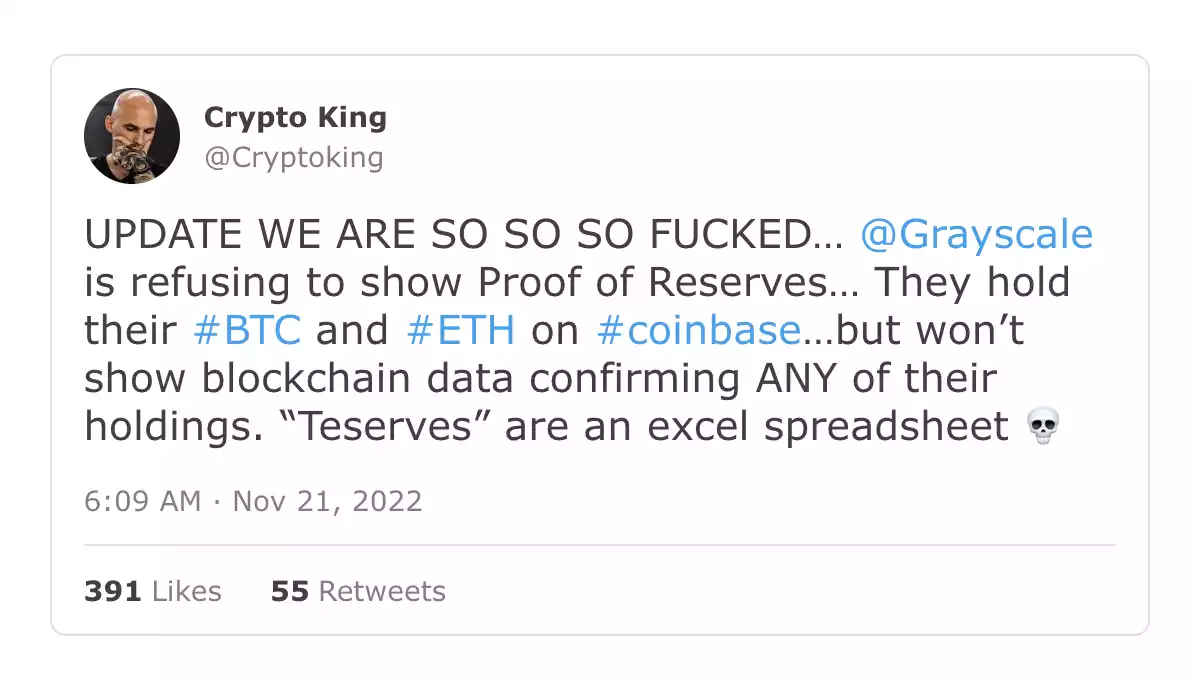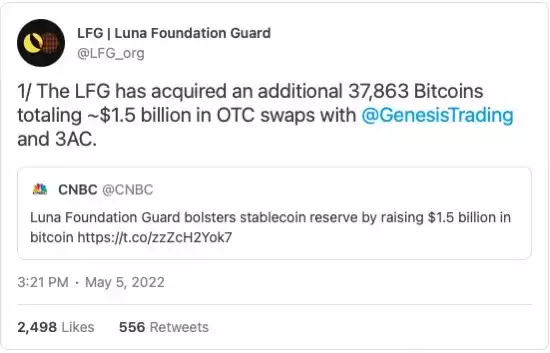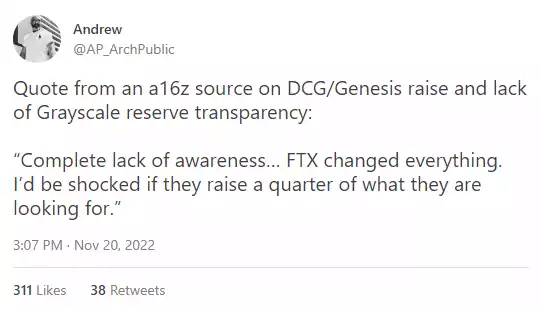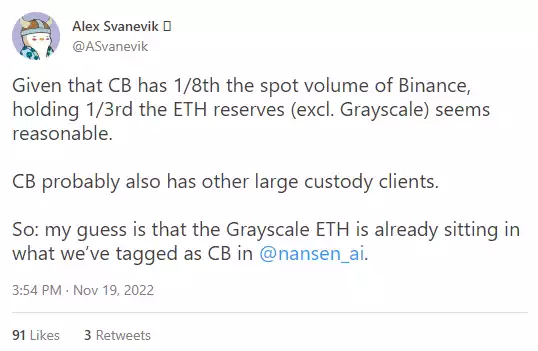FTX's corpse is still warm, and Genesis hangs by a thread
Original Title: 《Genesis is in Trouble》
Author: Jack Inabinet, Bankless
Compiled by: 0x214, 0x711, Kxp, BlockBeats
The aftershocks of the FTX collapse continue to loom large, leading the crypto lending platform Genesis into a series of market doubts. Bankless author Jack Inabinet published an article outlining the events: What is the relationship between Genesis, Grayscale, and DCG? What are the "suspicious connections" with Three Arrows Capital? What are the sources of risk for Genesis? How will the situation evolve? BlockBeats has organized and translated the content as follows:
Genesis, are you in trouble too?
Last week, Genesis's lending division, Genesis Global Capital, which focuses on serving institutional clients, suspended redemptions and new loan issuance.
Subsequently, rumors about Genesis's impending bankruptcy began to spread widely on Twitter.
As the only major brokerage firm in the crypto market providing comprehensive services, Genesis's solvency has come under scrutiny. However, Genesis is not the only institution facing a crisis; the asset situation of the Bitcoin trust product GBTC has also faced similar doubts. Previously, its issuer Grayscale stated that it would not share proof of its reserves audit, citing "security concerns."
What do Genesis and Grayscale have in common?
First, they are both subsidiaries of the crypto company Digital Currency Group (DCG).
Rumors suggest that after DCG injected $140 million in new funds into Genesis last week, its liquidity has nearly run out. Previously, Genesis's lending division was unable to withdraw $175 million from its FTX account, leading to Genesis announcing the suspension of redemptions and new loan issuance.
This news has left crypto users eager to know: how much worse can this get?
Today we finally have an answer: Genesis is indeed on the brink of bankruptcy…
But Genesis has no immediate plans to file for bankruptcy. So… this is good news, right?
In fact, it is not. The collapse of FTX and the subsequent tightening of crypto credit have triggered a credit crisis that has affected the entire industry, leading to a run on Genesis. Currently, Genesis's emergency financing target is an additional $500 million, which is half of its initial fundraising goal of $1 billion. Binance is considered a potential source of funds, although the WSJ is also uncertain whether Binance will actually proceed with the transaction.
So, what is Genesis?
Let's step back from this situation and clarify what Genesis is and the potential sources of its financial risks.
For all the services provided by Genesis, refer to Ram Ahluwalia's Twitter Thread (which this article also summarizes).
Compared to traditional brokerage firms, Genesis offers the same services and functions, while tailoring its products for institutional clients. Major brokerage products like Genesis include lending services and over-the-counter trading services.
In traditional financial markets, major brokers like Goldman Sachs offset positions through counterparties. Suppose a Goldman Sachs client wants to go long $100 million in U.S. Treasuries: if Goldman Sachs completes this order without hedging, they will short $100 million in U.S. Treasuries. If yields start to fall, Goldman Sachs will be at a loss, but if yields continue to rise, Goldman Sachs will profit from the position.
Goldman Sachs does not expose itself to price fluctuations of the underlying securities but simultaneously establishes long positions with JPMorgan, offering its clients a slightly higher price than what it obtained from JPMorgan (the buy price).
This allows traders to capture the bid/ask spread when executing client orders without taking directional risk.
As a pioneer in the crypto over-the-counter and wholesale brokerage market, Genesis has not had the same opportunities as traditional financial institutions to enter the robust inter-dealer market. Genesis attempts to provide the same services as its traditional counterparts, despite lacking similar risk management solutions.
Sources of Risk for Genesis
We know that Genesis is no longer processing withdrawal requests. But what is the reason?
Genesis is facing issues related to liquidity and potential solvency.
Liquidity Issues
Like a bank primarily funded by demand deposits, Genesis relies on short-term funding sources, including Circle's yield program and Gemini Earn. Additionally (similar to banks), Genesis has related businesses that convert assets as they mature, meaning Genesis can use these short-term deposits to provide long-term loans.
The longer duration of borrowed funds allows Genesis to capture the spread between its capital costs and interest income, laying the foundation for a potentially profitable business model. However, this strategy carries the risk that a bank-like entity may not have enough liquidity to meet unexpected large withdrawal requests.
During times of economic instability, lenders typically want to recover outstanding credit as quickly as possible to support their cash/liquid asset reserves. Short-term deposit sources, such as the funds previously used to finance Genesis, which allowed users to withdraw on demand, are among the primary places lenders seek liquidity.
Just before Genesis froze withdrawals, individuals and institutions (including Genesis) with funds on FTX suddenly lost all funds considered liquid. Moreover, FTX's mismanagement of user funds reignited user outrage over crypto lending practices, and calls for a re-examination of under-collateralized and off-chain lending practices grew louder.
The FTX collapse has sparked a market demand for liquidity locked in trading platforms, significantly reducing the willingness of crypto ecosystem users to lend to centralized black boxes, leading to a decrease in available funding sources for Genesis.
Unfortunately, (similar to banks) Genesis has issued loans with long durations and does not have enough liquid funds to meet the unusually large withdrawal requests following the FTX explosion.
Genesis's liquidity issues may be "a blessing in disguise," as the possibility of resuming withdrawals in the near future is not small. In this case, if Binance steps in to help, as mentioned above, or if other potential solutions arise, Genesis may quickly resume withdrawals.
Note: On November 22, according to the Wall Street Journal, Binance has decided not to invest in Genesis due to concerns that some of Genesis's businesses may create conflicts of interest in the future.
Solvency Issues
Genesis may face counterparty risks related to duration management activities and position hedging.
Duration can be used to measure the sensitivity of the value of assets and liabilities to changes in interest rates. A longer duration means that the price sensitivity of assets and liabilities to interest rate fluctuations is higher; higher interest rates negatively impact valuations, while lower interest rates have a positive effect. If we provide longer-term loans while using shorter-term funding sources, the difference in duration can expose the financial entity to the risk of duration mismatch.
This means that for Genesis, in the event of interest rate changes, Genesis's assets will be more affected than its liabilities.
Before managing its duration gap, Genesis's solvency will have a negative correlation with interest rate changes. Given the current stagnation of the cryptocurrency credit market and the rise of risk-free interest rates, under the influence of tightening monetary policy, Genesis, which has not hedged its risks, will find itself in a solvency predicament.
While Genesis may hedge against the risk of rising interest rates, if a major counterparty in its duration management strategy goes bankrupt, Genesis will face directional risk exposure, further increasing its own bankruptcy risk.
Remember those Bitcoins purchased by the Luna Foundation Guard with UST?
Genesis obtained $1 billion in UST from this swap transaction. While Genesis is likely to hedge their risk against UST, if a counterparty in the hedge goes bankrupt, UST will also face directional risk.
Currently, the market value of this $1 billion UST is only $23 million.
The bankruptcy of every crypto hedge fund increases Genesis's directional risk to cryptocurrency assets, including unsold UST.
Compared to liquidity issues, counterparty risk poses a much greater threat to Genesis. The availability of liquidity only affects the timeliness of Genesis's repayments, while counterparty risk directly impacts Genesis's solvency.
Affected by counterparty bankruptcies, failures in risk management strategies will negatively impact Genesis's solvency and lead to reduced payments to creditors.
Suspicious Connections
What do Genesis, Three Arrows Capital, GBTC, and DCG have in common?
Grayscale (a subsidiary of DCG) is the trustee of GBTC. In exchange for its services, Grayscale charges a 2% management fee on all assets under trust management annually. According to its Q3 regulatory filing with the SEC in 2022, Grayscale has earned over $302 million in fee income from GBTC year-to-date, compared to $433 million in the same period in 2021.
Genesis (also a subsidiary of DCG) is a major lender to Three Arrows Capital. According to an analysis by DataFinnovation of publicly available SEC and investor documents in July, Genesis essentially lends to Three Arrows Capital based on its single counterparty limit.
Analysis suggests that Three Arrows Capital borrows BTC from Genesis in exchange for collateral, returns the BTC to Genesis to create GBTC (Genesis is the only authorized entity to create GBTC shares), and then returns the GBTC to Genesis, repeating the cycle.
When GBTC trades at a price higher than BTC, Three Arrows Capital essentially makes a profit and uses the profits to increase its exposure to GBTC and other crypto assets. If the premium continues, theoretically, Three Arrows Capital could repeat this arbitrage process indefinitely.
By increasing Grayscale's BTC trust's AUM to boost fee income, DCG profits handsomely from this transaction.
Unfortunately, as selling pressure on GBTC increases and demand for the product decreases, this premium has turned into a discount. Coupled with Luna's death spiral (a significant investment position previously in the Three Arrows Capital portfolio), the end result is that Three Arrows Capital is insolvent.
Genesis is unlikely to fully recover its outstanding loans to Three Arrows Capital, and given the lack of mature counterparties in cryptocurrency, they may face significant counterparty risk with Three Arrows Capital.
The existing lending relationships and potential counterparty risks with Three Arrows Capital (or other insolvent crypto funds) have created ongoing liquidity pressure for Genesis and become a source of risk for its bankruptcy default.
Grayscale FUD
DCG not only has to deal with issues related to Genesis's withdrawals and solvency but also has been forced to defend its support for GBTC due to its refusal to release wallet addresses holding Grayscale trust assets or their complete reserve audit proof.
In the wake of the FTX incident and concerns over forged reserve audit proofs from trading platforms, Grayscale's hesitation to present its reserve audit proof is undoubtedly a poor practice!
There have been attempts by third parties to verify on-chain that about 50% of GBTC holdings can be traced back to BTC held by the trust.
However, Coinbase Custody defended Grayscale, confirming that GBTC and other Grayscale products are still fully backed by assets controlled by Coinbase Custody.
Nansen CEO Alex Svanevik discovered through relevant analysis that Grayscale's ETH products are likely fully backed by reserves held by Coinbase Custody, further confirming that GBTC is fully supported.
Coinbase Custody is unlikely to distort the holdings of GBTC, as such actions would be fraudulent and could expose Coinbase to legal liability. However, after the FTX collapse and the resulting scandal allegations, it is not entirely unimaginable that Coinbase could commit fraud regarding its BTC holdings on behalf of Grayscale.
The DCG Situation Unfolds
Concerns about Genesis's solvency and Grayscale's support (as well as the overall financial health of DCG) persist, and the failure of any one of these organizations would have catastrophic effects on the crypto industry.
The impact of Genesis is much larger than that of FTX, as it provides (or has provided) major brokerage services that enable institutional investment in cryptocurrency.
If the situation ends with Grayscale liquidating its trust, it would bring billions of dollars in selling pressure on BTC, ETH, and other Grayscale assets, which would devastate the crypto market. However, considering the fee income generated by the products and the group's profitability, this outcome still seems unlikely.
While it remains unclear how the Genesis situation will resolve, the short-term fate of the broader crypto industry once again hinges on the solvency of another black box CeFi entity. Given that Genesis is the link for institutional investment in cryptocurrency, if it fails, the consequences could be dire.
Buckle up. The road ahead is bumpy!
















